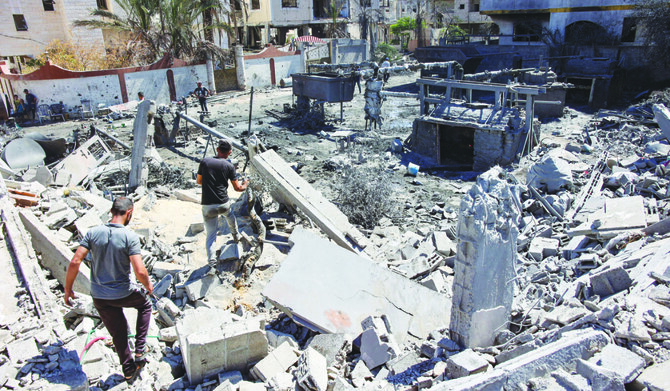ISTANBUL: A senior Hamas official said on Sunday that the group wants “joint Palestinian rule” in Gaza once war ends in the besieged territory.
“Clearly, we said that the next day must be Palestinian ... the day after the battle is a Palestinian day,” Osama Hamdan said during an interview in Istanbul.
He said that the Palestinian movement had ample resources to continue fighting Israel despite losses sustained over more than 11 months of war in Gaza.
“The resistance has a high ability to continue,” Hamdan said.

Hamas official Osama Hamdan speaks during an interview with AFP in Istanbul on September 15, 2024. (AFP)
“There were martyrs and sacrifices ... but in return, there was an accumulation of experiences and the recruitment of new generations into the resistance.”
His comments came less than a week after Israeli Defense Minister Yoav Gallant told journalists that Hamas, whose Oct. 7 attack triggered the war, “no longer exists” as a military formation in Gaza.
Israeli Prime Minister Benjamin Netanyahu launched retaliatory military operations to destroy Hamas after the group’s surprise attack on southern Israel.
The Israeli military campaign has killed at least 41,206 people in Gaza, according to the territory’s Health Ministry, which does not provide breakdowns of civilian and militant deaths.
Netanyahu is facing mounting domestic pressure to seal a deal in which hostages would be released in exchange for Palestinian prisoners.
Israel’s announcement this month that the bodies of six hostages had been recovered from a tunnel in Gaza after they were “executed’ by Hamas spurred an outpouring of grief and anger, leading to a brief general strike and large-scale demonstrations that continued in Tel Aviv and Jerusalem on Saturday night.
But months of negotiations aimed at securing a truce have apparently stalled.
In the interview on Sunday, Hamdan said the US, Israel’s most crucial military backer, was not doing enough to force concessions from Netanyahu that would end the bloodshed.
“The American administration does not exert sufficient or appropriate pressure on the Israeli side,” Hamdan said.
“Rather, it is trying to justify the Israeli side’s evasion of any commitment.”
During two press conferences after officials announced the deaths of the six hostages earlier this month, Netanyahu said it was Hamas who refused to compromise and vowed “not to give in to pressure” on remaining sticking points.
He also said Israel’s military campaign had killed “no less than 17,000” Hamas militants.


























